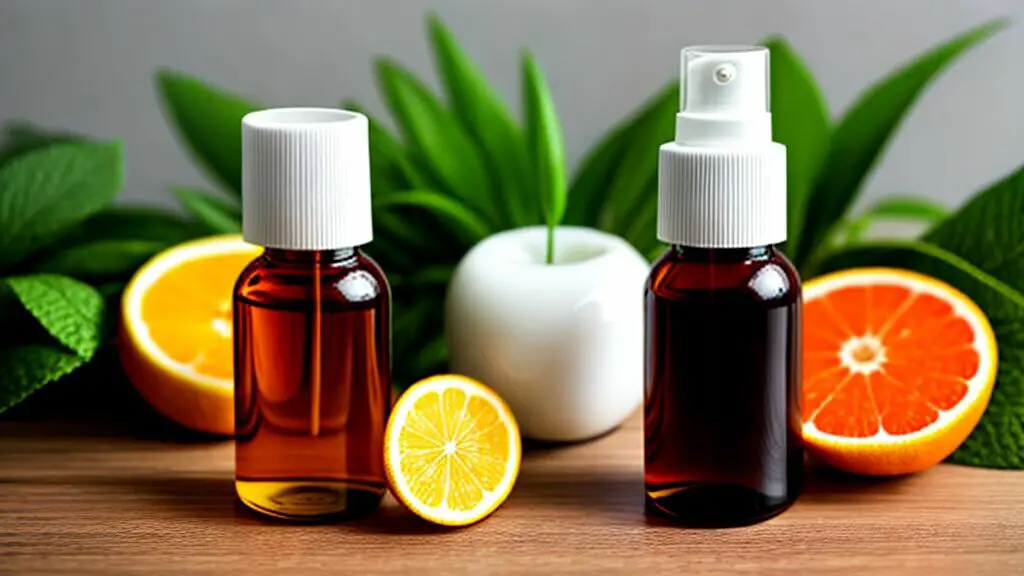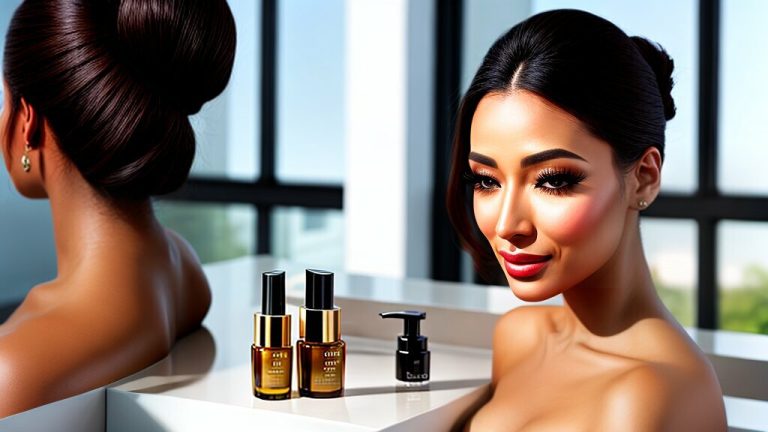What Does Serum Mean? Exploring Its Importance and Uses
If you’re a skincare enthusiast, you’ve heard of serums. But what exactly does serum mean? A serum is a lightweight skincare product with potent ingredients designed to penetrate the skin deeply. Unlike moisturizers and creams, which sit on the skin’s surface, serums are formulated to deliver targeted benefits where they are needed most.
So, why are serums such an essential part of a skincare routine? The answer lies in their ability to address specific skin concerns. Whether you’re dealing with dark spots, fine lines, or dullness, there’s a serum out there that can help. Additionally, serums can help to enhance the effectiveness of other skincare products, making them a powerful tool in any beauty arsenal.
Key Takeaways
- A serum is a lightweight skincare product designed to penetrate the skin deeply.
- Serums contain potent ingredients that can address specific skin concerns.
- Serums can help to increase the effectiveness of other skincare products.
Understanding Serum: A Comprehensive Definition
Serum is a skincare product that has gotten an immense popularity recently due to its effectiveness in addressing specific skin concerns. In its simplest definition, serum is a lightweight liquid with a higher level of concentration of active ingredients. These ingredients are designed to penetrate deeply into the skin, delivering targeted benefits.
Serums are formulated with a specific purpose in mind, whether to hydrate, brighten, or reduce the appearance of wrinkles. They are typically thinner in consistency than moisturizers or creams, allowing for better absorption into the skin. Serums are also free of heavy emollients and occlusive agents, which can sometimes interfere with the absorption of other skincare products.
What sets serums apart from other skincare products is their unique composition. Unlike moisturizers and creams, serums contain a higher concentration of active ingredients. This allows them to deliver more potent and targeted benefits to the skin. They also have a smaller molecular structure, which enables them to penetrate more deeply into the skin’s layers, providing visible results.
Overall, serums are an essential component of any comprehensive skincare routine. They offer targeted benefits that cannot be achieved with other products, making them effective in achieving healthy, radiant skin.
The Significance of Serum in Skincare
Serums have become essential to many skincare routines due to their targeted benefits and effectiveness. Unlike creams and moisturizers, which primarily focus on hydrating the skin’s surface, serums are formulated with more active ingredients that can penetrate deep into the skin.
This unique characteristic makes serums ideal for targeting specific skin concerns, like pigmentation, fine lines, and acne. By delivering active ingredients directly to the skin’s lower layers, serums can provide more significant and noticeable improvements in skin health and appearance.
Enhancing the Effectiveness of Other Skincare Products
In addition to addressing specific skin concerns, serums can enhance other skincare products’ effectiveness. By creating a clean and hydrated foundation for other products to adhere to, serums can help maximize the effectiveness of moisturizers, sunscreens, and other skincare products.
Furthermore, serums can also help other products pierce deeper into the skin, making them more effective. Applying a serum first can create a pathway for other skincare products to pierce deeper into the skin and provide more noticeable results.
The Health Benefits of Serum
Besides being a popular skincare product, the serum has several potential health benefits. The nourishing and regenerative properties of serums can positively impact the health and look of your skin.
Promotes Collagen Production
Serums are often infused with ingredients that boost collagen production, like vitamin C and retinol. Collagen is a form of protein which plays a vital role in retaining the skins elasticity, and its production decreases as we age. By including serums into your skincare routine, you can maintain or even increase collagen production, resulting in firmer, more youthful-looking skin.
Improves Overall Skin Health
Serums are formulated with more active ingredients than other skincare products, making them a potent addition to any routine. They can help nourish and protect the skin, contributing to a healthier, more vibrant complexion. Serums can also provide targeted benefits, such as minimizing the look of fine lines and wrinkles, improving skin texture, and minimizing pores.
Additional Benefits
Besides promoting skin health, some serums may have additional benefits. For example, serums infused with antioxidants can help save the skin from environmental stressors like pollution and UV rays. Other serums may contain anti-inflammatory ingredients, which can soothe and calm irritated skin. While the specific benefits of serums may vary, they are generally considered a valuable tool in maintaining optimal skin health.
Different Types of Serums and Their Uses
Serums are a versatile addition to any skincare routine, as they can address many skin concerns. When choosing a serum, it’s essential to consider your individual needs and skin type. Here are some common types of serums and their specific uses:
| Type of Serum | Uses |
|---|---|
| Hydrating Serums | Provide an intense boost of moisture to dry or dehydrated skin. |
| Brightening Serums | Help minimize the look of dark spots and hyperpigmentation, further resulting in a brighter and more even complexion. |
| Anti-Aging Serums | Contain ingredients like retinol and collagen to minimize the indication of aging, such as fine lines and wrinkles. |
| Acne-Fighting Serums | Help control acne breakouts and minimize the appearance of acne scars. |
| Soothing Serums | Can calm and soothe irritated or inflamed skin, making them ideal for sensitive skin. |
It’s important to note that many serums can offer multiple benefits, and it’s not uncommon for individuals to use more than one type of serum in their skincare routine.
How to Incorporate Serum into Your Skincare Routine
Including a serum to your skincare routine is easy and can make a difference in achieving healthy, glowing skin. Follow these simple steps to incorporate serum into your daily routine properly:
- Cleanse: Clean your face with a gentle cleanser to remove any dirt, oil, or makeup.
- Tone: Apply toner to your skin to restore pH balance and prepare it for serum absorption.
- Apply Serum: Take a small amount of serum and gently dab it onto your face. Start from the center of your face and work your way outwards, using upward motions. Remember to avoid the eye area.
- Wait: Allow the serum to absorb fully into your skin. This may take a few minutes, but giving your skin enough time to absorb all the beneficial ingredients is essential.
- Moisturize: Once the serum gets fully soaked into the skin, apply your moisturizer to seal in the serum and provide additional hydration.
- Sun Protection: Finish your routine by applying sunscreen to protect your skin from UV rays.
It’s important to note that the order in which you apply your serum and moisturizer may vary depending on your serum type. Some serums are designed to be applied after moisturizer, while others are meant to be used before. Read the instructions on the product label and adjust your routine accordingly.
Common Ingredients Found in Serums
Serums are packed with powerful ingredients that target specific skin concerns. Let’s take a look at some of the most common ingredients found in serums:
| Ingredient | Benefits |
|---|---|
| Hyaluronic Acid | Provides intense hydration, plumps the skin, and helps minimize the look of lines and wrinkles. |
| Vitamin C | Brightens and evens skin tone, promotes collagen production and protects against environmental stressors. |
| Retinol | Stimulates cell turnover minimizes the look of lines and wrinkles, and make better the overall texture of the skin. |
| Peptides | Stimulate collagen production, minimizes the look of lines and wrinkles, and improve skin elasticity. |
Other ingredients commonly found in serums include niacinamide, alpha hydroxy acids, beta hydroxy acids, and antioxidants like vitamin E and green tea extract.
When choosing a serum, looking for ingredients that address your specific skin concerns is essential. For example, if you want to brighten your skin, choose a serum with vitamin C. To minimize the look of lines and wrinkles, look for a serum with retinol or peptides. It’s also important to pay attention to the concentration of the active ingredients in the serum to ensure maximum effectiveness.
Tips for Choosing and Buying Serums
Choosing the suitable serum for your skin care needs can be overwhelming, with many options. Here are some tips to help you select and buy the best serums for your skin:
Consider Your Skin Type
Before purchasing a serum, identify your skin type. Different serums cater to skin types, whether oily, dry, or combination. Select a serum formulated to target your specific skin type, and you’ll see better results.
Determine Your Skincare Concerns
Another factor to consider is your skincare concerns. Do you want to brighten the skin, reduce fine lines, or hydrate dry skin? Different serums have different benefits, so choose one based on your specific concerns to achieve the desired results.
Read Product Labels and Reviews
Reading product labels to know what you’re putting on your skin is essential. Look for serums free of harmful chemicals and contain active ingredients for example: hyaluronic acid, vitamin C, and peptides for effective results. Additionally, read customer reviews to gain insights about a product’s effectiveness and whether it is suitable for your skin type and concerns.
Don’t Break Your Budget
While investing in skincare is essential, it doesn’t mean you need to break the bank. There are plenty of affordable serums that offer excellent results. If you’re on a budget, don’t hesitate to explore less expensive options.
Test Before Full Application
Before applying a new serum, do a patch test to make sure your skin wont react negatively. Apply a tiny amount of the serum to a small area on your arm and wait 24 hours. You can safely put it to your face if there is no redness or allergic reaction.
By following these tips, you can select and buy the perfect serum for your skin type and concerns, helping you achieve healthier-looking skin.
Serums vs. Other Skincare Products: What Sets Them Apart?
Serums are often compared to other skincare products like moisturizers and creams, but some key differences set them apart.
Firstly, serums are lightweight and have a thinner consistency compared to moisturizers and creams. This allows them to pierce deeper into the skin and deliver targeted active ingredients more effectively.
Secondly, serums are formulated with more active ingredients such as antioxidants, hyaluronic acid, and peptides. This makes them more potent and effective at addressing skin problems like fine lines, dark spots, and dehydration.
Lastly, serums are typically used as a supplementary step in a skincare routine, after washing and toning but before moisturizing. They are specifically designed to increase the effectiveness of other skincare products by providing additional nutrients and moisture to the skin.
While moisturizers and creams provide general hydration and nourishment, serums offer targeted solutions for specific skin concerns and are a must-have in any comprehensive skincare routine.
Serums: A Must-Have in Your Skincare Arsenal
Incorporating a serum into your daily routine is necessary if you’re serious about caring for your skin. Serums offer a range of benefits that go beyond those of traditional moisturizers and creams. Here’s why:
- Targeted Results: Serums are formulated to address specific skin problems like lines, dark spots, and dryness. They contain higher level of concentrations of active ingredients that pierce deeply into the skin, delivering visible results.
- Enhanced Effectiveness: Using a serum can boost the effectiveness of your other skincare products. The lightweight texture of serums allows them to be easily layered under moisturizers and sunscreens, creating a barrier that locks in the benefits of your entire skincare routine.
- Effective for All Skin Types: Whether you have sensitive, oily, or dry skin, there’s a serum out there for you. The versatility of serums makes them a great addition to any skincare regimen, helping to address various concerns while providing nourishment and hydration to the skin.
By incorporating a serum into your daily routine, you can unlock the full potential of your skincare regimen, achieving healthy, glowing skin that looks and feels its best.
Conclusion
Now that you understand what serum means and its significance in skincare and health, it’s time to unlock its potential. Serums offer a range of benefits, from nourishing the skin and promoting collagen production to targeting specific skin concerns.
By including serums into your skincare routine, you can increase the effectiveness of other skincare products and achieve a brighter, healthier complexion. With different types of serums available in the market, you can easily find a perfect one that suits your needs.
Stay confident with the wide variety of serums available. By following our tips on choosing and buying serums and learning how to incorporate them into your skincare routine correctly, you can harness the power of serums and achieve your best skin.
So why wait? Try adding a serum to your skincare arsenal today and see the difference.

I’m Carol Edwards, the force behind SerumDeals.com – your one-stop for all things serum. With over a decade of obsessing over skincare, I’m here to demystify sensational skin. I dig deep, testing serums in action. Beyond the surface, I uncover actual effectiveness. From ingredient breakdowns to real-life testing, my reviews are your trustworthy guide. Whether you’re a skincare rookie or diving into specifics like anti-aging or hydration, I’ve got your back with accurate info. Let’s simplify the serum journey together. SerumDeals.com isn’t just a site; it’s a hub for thriving skincare aficionados. Join me to uncover vibrant skin, one serum at a time.
Glowingly, Carol Edwards






